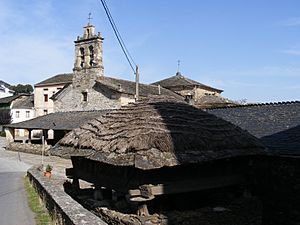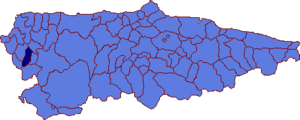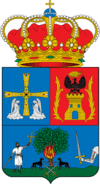San Martín de Oscos facts for kids
Quick facts for kids
San Martín de Oscos
Samartín d'Ozcos
|
||
|---|---|---|

San Martín de Oscos
|
||
|
||
 |
||
| Country | ||
| Autonomous community | ||
| Province | Asturias | |
| Comarca | Eo-Navia | |
| Judicial district | Castropol | |
| Capital | San Martín | |
| Area | ||
| • Total | 66.56 km2 (25.70 sq mi) | |
| Highest elevation | 1,081 m (3,547 ft) | |
| Population
(2018)
|
||
| • Total | 393 | |
| • Density | 5.904/km2 (15.292/sq mi) | |
| Time zone | UTC+1 (CET) | |
| • Summer (DST) | UTC+2 (CEST) | |
| Postal code |
33777
|
|
San Martín de Oscos is a small and charming area in the northwest of Spain. It is part of Asturias, which is an "autonomous community" or a self-governing region. The local name for this place is Samartín d'Ozcos.
This area is like a small town or district, called a "municipality". It shares its borders with other places. To the north, you'll find Illano. To the south, it borders Grandas de Salime. On the east side, it's next to Pesoz, and to the west, you'll find Santa Eulalia de Oscos and Villanueva de Oscos.
Contents
Discovering San Martín de Oscos' Past
The story of San Martín de Oscos goes back a very long time. People first lived here during the Stone Age. This was a time when humans started farming and building settlements. We know this because of old burial mounds found in a place called Os Pedrousos.
Ancient Mining and Forts
People in San Martín de Oscos also worked with metals. There are signs of old mines in areas like Arruñada and Piorno. You can also find traces in the Covas del Resalao, Sotuelo, and Ahío valleys.
The people who lived here long ago also built strong forts. These forts were on high ground, like at San Isidro and Pico de la Mina. They were built to protect the people from enemies. These forts had ditches, walls, and stones to make it hard for attackers to get close. A special gold crown, called a diadem, was found nearby. It might have belonged to the people who lived in these forts.
Even the ancient Romans were interested in the metals here. They left behind signs of their metal-working in Tabladas. You can see old stone pots and piles of waste from their smelting work.
Becoming an Independent Town
During the Middle Ages, San Martín de Oscos was connected to the church in Oviedo. This connection lasted for many years.
However, in 1584, things changed. King Felipe II of Spain needed money for wars. He decided to sell some of the church's lands. The people of San Martín bought their land and became an independent town. This was a big step for them!
In the early 1800s, young people from Oscos joined the fight against French rule. This was during the War of Independence. They helped protect their land and country.
Exploring the Parishes of San Martín de Oscos
A "parish" is like a small local area within the municipality. San Martín de Oscos has four main parishes. Each parish has its own small community.
- Illano (also called Eilao) - In 2006, about 12 people lived here.
- Labiarón - This parish had about 70 people living there in 2006.
- Oscos (parish) - This is the largest parish, with about 368 people in 2006.
- Pesoz (parish) - In 2006, only about 16 people lived in this parish.
See also
 In Spanish: San Martín de Oscos para niños
In Spanish: San Martín de Oscos para niños
 | Emma Amos |
 | Edward Mitchell Bannister |
 | Larry D. Alexander |
 | Ernie Barnes |



